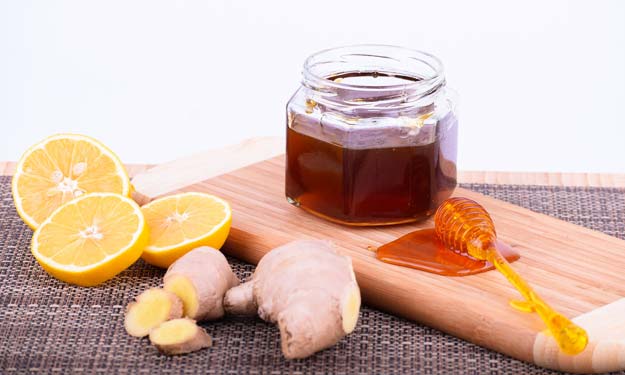Ginger Tea
Scientific name: Zingiber officinale
Also Known As: Zingiberis rhizoma, ginger root tea, shen jiang
Ginger is the underground stem, or rhizome, of the plant Zingiber officinale. The ginger root is gnarled and ugly on the outside.
It can be stored for several weeks, or dried, then made into a powder. Once only found in Asian specialty food stores, ginger root can now be found at any grocery store in the produce area.
What is Ginger Tea? Ginger tea is made from the root of the plant. The tea can be made from fresh or dried ginger, although whole ginger makes a more balanced tea.
Ginger Tea Preparation
- 4 cups of water
- 2-inch fresh ginger piece
- Lemon slice and honey (optional)
Peel and slice the ginger root. Bring water to a boil in a saucepan, then add the slices of ginger to boiling water, and reduce heat.
Cover the saucepan, and let simmer for about 15-20 minutes. Then strain liquid and add lemon and/or honey to taste.
Home Remedies Using Ginger Tea
Benefits of Ginger Tea
Historically ginger tea has been used for centuries in India and China as a treatment for stomach upsets and nausea. It was also used to treat flu and colds.
The yang energy is believed to warm the lungs and stomach. It was also used to treat sore throat, nasal congestion, and sinus pain.
Today Ginger Tea is used to treat colds, sore throat, flu, nausea, and indigestion, including when associated with motion sickness or pregnancy. It is also used as a digestive aid, helping to neutralized stomach acid and stimulates digestive juices.
Ginger tea is believed to help in the treatment of diarrhea, and support blood circulation. It is effective against headache and stress, as well as a treatment for fibromyalgia pain.
Ginger is often mixed with peppermint tea for the treatment of colds and flu.
Often researched there have been several studies done on the affect of ginger on motion sickness and nausea. One stated, “Ginger may be more effective than placebo in reducing symptoms associated with motion sickness.
In one trial of 80 novice sailors (prone to motion sickness), those who took powdered ginger experienced a significant reduction in vomiting and cold sweating compared to those who took placebo.”
Side Effects of Ginger Tea
It is important to note that ginger tea is a blood thinner and should not be taken within two hours of aspirin.
Ginger should not be taken with warfarin or other medications of this type.
Too much ginger tea may cause heartburn. It should not be taken by anyone with a gastric ulcer or if they are suffering from gallstones as ginger promotes the production of bile.



